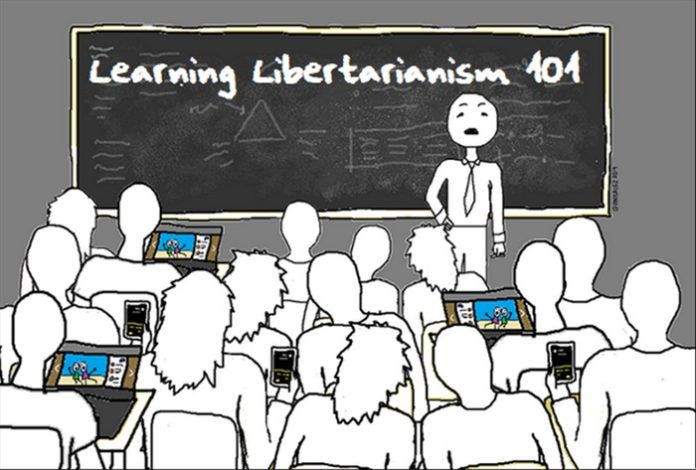Many people have difficulty understanding exactly what libertarianism is all about.
Unfortunately many libertarians also have the same difficulty. Many just don’t understand the difference between the Libertarian Party and the libertarian philosophy. Others don’t know libertarianism beyond it being a “Libertarian Wing” of the Republican Party.
Furthermore, philosophical libertarians who embrace the Non-Aggression Principle against all coercion, intimidation and fraud call Libertarian Party members “minarchists” because they believe in a minimal state with a government that requires—guess what—at least some coercion, intimidation and fraud.
In turn these minimal “watchdog government” statists call non-political libertarians “anarchists” because they won’t accept that a government is still necessary if it means maintaining some form of authoritarian control over others.
Then there are also Voluntaryist Libertarians, Agorist Libertarians, Mutualist Libertarians, Bleeding Heart Libertarians, Left Libertarians, Right Libertarians, Libertarian Republicans, Libertarian Democrats, Anti-Libertarians, Civil Libertarians which are really old-style liberals that practically don’t even exist anymore, Libertarian Socialists which are a whole different story, Alt-Libertarians which nobody considers as “real” libertarians except themselves, Former Libertarians who never really were libertarians except they thought they were and then they weren’t, and Post-Statist Libertarians who change the whole definition of coercive “governments” in order to transform that institution into voluntary consumer-controlled “governance.”
So, you see, it’s not as simple as everyone thought it was.
Unfortunately—or perhaps fortunately—this article is not an explanation of all of those various libertarianisms or any other libertarianisms that weren’t listed above. This article is an overview of what one might find if there was such a thing as a Libertarian Study Guide in any of America’s various universities.
(Caveat: This is an in-joke. Readers who are not libertarians may not get it. Libertarians who don’t have a sense of humor shouldn’t read it. Libertarians who disagree with anything in this article shouldn’t bother sending any nasty emails or posting any angry comments because libertarians seldom agree with one other on much of anything anyway.)
The following is an example of some of the courses offered in this Syllabus
Libertarius University Course Description & Syllabus
Libertarian Evolution—Traces the evolutionary development of a typical member of the modern American freedom movement from simple individualist to science fiction fan to Objectivist to libertarian to Libertarian Party member to anarchist to Anarcho-Capitalist to radical Rothbardian-Konkinite Anarcho-Transhumanistic Punk/Rock Minimalist to simple individualist.
Presentation includes illustrative slides of the socio-politico periodic table and timeline charts.
Extra Credit: Learn how to read and understand the Nolan Chart
Renaming The Libertarian Party—A one-semester overview that traces the history of the on-and-off efforts by timid Libertarian Party members to find a non-threatening name for their chosen political organization.
Class discussions will include such hopeful banalities as The Freedom Party, The Freedom and Responsibility Party, The Free Will Party (not to be confused with The Free Willy Party), The Liberty Party, The Liberty Penguin Party, and The Softsoap Party, the latter name designed to smuggle such scary concepts as self-ownership and personal responsibility into the minds of the general populace in the hope that they will adopt the ideas without even knowing it.
Prerequisites: Renaming Liberal to Classical Liberal; Renaming Socialist to Progressive to Mainstream; Renaming Jingoism to nationalism to Republican Party.
Studies in Libertarian Psychology—Explores the euphoria-to-disillusionment phenomenon experienced by most libertarians when they think they see “libertarian” printed in their local newspapers, only to discover that it was actually civil libertarian, librarian, Liberian, Iberian, or LeBaron, an automobile manufactured by the Company Formerly Known as Chrysler.
Course also touches on the similar delusional reading of antichrist, anachronist, and archivist for “anarchist.”
Contrarian Conceptualizations of Austrian Economics—Course focuses on the fallacies of economic fallacies when considered from the viewpoint of the fallacy’s beneficiaries. Students will study:
- The Amalgamated Glaziers Union lobbying efforts against the Broken Window Fallacy
- The benefit of perpetual warfare to Military-Industrial Complex shareholders such as shut-ins and widows living on fixed incomes
- The Federation of Soup Kitchen Recipient’s opposition to the Free Lunch Fallacy
- Federal Government Economists United Against Economic Fallacies
Prerequisite: Repealing the Law of Unintended Consequences 101
Libertarian Political Science—This lecture series covers a wide range of how-to topics in the art of political persuasion. Presentations include:
- Techniques of Stupefying Speechifying: (“The cult of the omnipotent state exerts coercion on the fruits of my labor”)
- How to be a Fringe Candidate and Embarrass the Party: (“Join me in the fight against hollow earth black helicopter assassination conspiracies”)
- Campaigning on a Shoestring (“Meet the Candidate Petition Signing and Bake Sale Event”)
- Promoting The Fusion of Purity and Pragmatism (“I advocate the immediate abolition of mostly all bad taxes to be phased in gradually!”)
Students will write their own libertarian campaign platforms carefully designed not to trigger Libertarian-Republicans, Alt-Libertarians, Anarcho-Libertarians, Former Libertarians or Small L libertarians.
Randian Behaviorial Anthropology—Investigates the difference between being an Objectivist and being an Aynrandian. Course underscores how Objectivism requires one to think for oneself while Aynrandianism requires one to think like Ayn Rand.
First Semester: Classroom discussions will center on how “A is A” is a fundamental Objectivist philosophical axiom but “I don’t like Moll Flanders because Ayn Rand said she didn’t like Moll Flanders” is quintessential Aynrandian Copy-Catechism.
Second Semester: how an Objectivist is an egoist but how “I’m superior to you because I read the John Galt speech in Atlas Shrugged three times” is just snotty. Includes group discussion topic, “Can you have a sense of humor and still be an Objectivist?”
Libertarian Punditry—Acquiring the skills required to become a practicing blogger or columnist with a libertarian perspective.
First Semester: Understanding how “Libertarian Opinion Writing” and “Snowflake Triggering” (aka Flaming) are equivalent concepts.
Second Semester: Application of writing techniques which enable the student to intelligently and wittily ridicule Republicans, Democrats, Socialists, Collectivists, Marxists, Social Justice Warriors and Free Stuff Millennials (FSMs).
Extra Credit: Essentials of Libertarian Infighting. Choose a niche libertarian ideology and then ridicule minarchists, anarchists, Objectivists, Libertarian Party activists, Austrian economists or Alt-Libertarians.
Essays on Being Both Objectivist and Libertarian—Canceled due to cyberbullying and virtual campus snowflake triggering.
Garry Reed writes as The Libertarian Opinionizer at HubPages.com.




















Gary, I’m new to GLM and I loved this tongue in cheek overview of the infighting between various libertarian factions. If “perfect is the enemy of better,” then Libertarians & Objectivists are the enemies of rolling back big government. Democratic socialists/progressives have been very successful with the incrementalist strategy of Fabian socialism. Our standard should be: “does this rollback big government in any way, big or small? “ If so, I’m for it. Keep fighting the good fight!
Hi again Fu. Funny thing, right after posting my response to your question in which I stated that many other libertarians have written about how to deal with murderers, rapists, child molesters, etc. in a free society I ran across this Ask & Answer in Quora: https://www.quora.com/When-libertarians-talk-about-deregulation-how-do-we-determine-which-regulations-to-scrap-and-which-should-be-kept
Thanks for the comment. My response is not a cop-out tho some will say it is. Suppose we lived in an absolute monarchy and we decided to start working toward a free society. But you ask for detailed explanations of how certain things will work in this future society. My answer would have been then as it is now: Don’t you think we should find ways of getting there first before we try to micromanage every little detail of some future society that doesn’t exist yet?
Yes what you say is very important and others have written long and detailed ideas of how a free society could handle those situations, from a minimal state to competing systems to private security to private arbitration to everyone assuming that everyone else is armed with concealed handguns.
Creating a free society will be a long slow process—we haven’t even convinced most people at this stage who insist we have “democratic socialism” in which everyone magically gets “free stuff” and lives at the expense of everyone else. So first let’s just concentrate on re-establishing the Renaissance values of self-ownership, individual freedom and personal property FIRST and let those future generations figure out the details of how their society will work once we begin to get closer to such a society.
Good overview Gary. My question to you is how does the non-aggression principle and libertarian framework apply to things like serial murderers and child molesters? It seems there should be some defining line where the state (generically speaking) and law should/must intervene when it comes to certain activities and behaviors of individuals. How would a libertarian framework apply to a situation like Love Canal where companies knowingly and secretly dumped toxic chemicals into the environment significantly harming the health of residents of the area? I do agree that the Libertarian Party is in need of a re-branding as recent attempts to stand up political candidates were jokes in and of themselves.